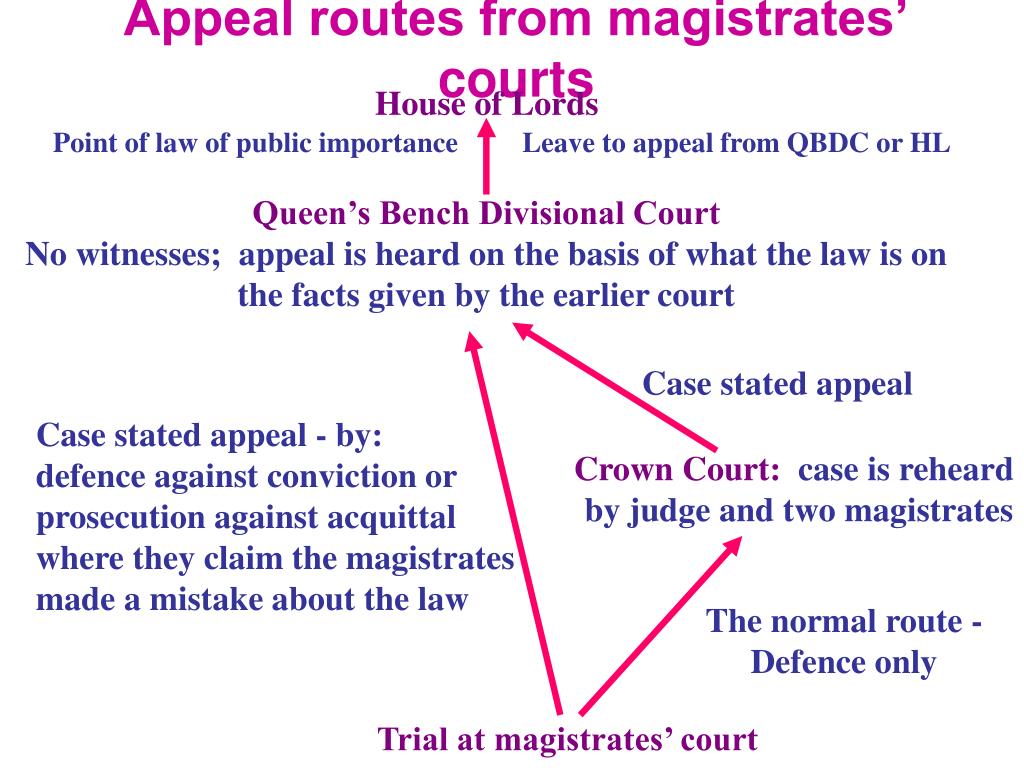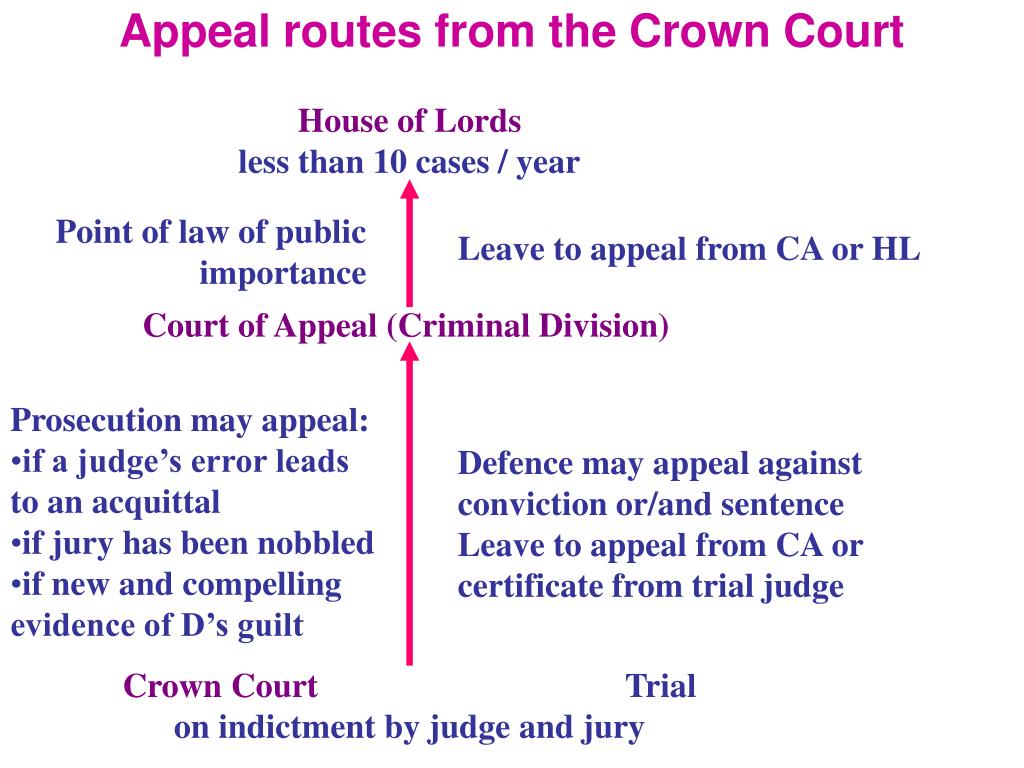Law ( ESL) - Courts( crim, appeal) and lay people
1/24
Earn XP
Description and Tags
the criminal process ; offences Court of Appeal; Criminal Courts( The Appeal Process) sentencing; lay people
Name | Mastery | Learn | Test | Matching | Spaced |
|---|
No study sessions yet.
25 Terms
Whose decisions should follow the Court of Appeal?
Supreme Court
In which case CofA might not follow THEIR previous decisions?(3)
if Supreme Court told so
if there is conflicting decisions
decisions were made per incuriam ( through lack of care)
Criminal Courts
Classification of offences
Summary offences
Triable either way
Indictable offences
Summary offences( criminal)
def.
e.g.
place of trial
persons hearing the trial
the least serious offences
common assault,criminal damage( less than £5000 damage), shoplifting( less than £200)
Magistrates Court
The magistartes
Triable either way(criminal)
def.
e.g.
place of trial
persons hearing the trial
middle range of trial
theft, assault causing actual bodily harm
EITHER Magistrates Court OR Crown Court( depends on whether pleaded guilty or not)
magistrates OR Jury and Judge
Indictable offences(criminal)
def.
e.g.
place of trial
persons hearing the trial
the most serious
murders, manslaughter, rape, robbery
Crown Court( although it always starts in Magist. Court)
Magistrates then jury and judge
Jurisdiction of Magistrates Court( which types of offences are they hearing)
try all summary cases
some trial either way
all cases for the first hearing( inc. indictable cases)
Jurisdiction of Crown Court
all indictable offences
some appeals from Magistr. Court
far more sentence in power ( in comparison to Mag. Court)
Draw the diagram of appeal routes from the Magistrates Court( Criminal)

Draw the diagram of appeal routes from the Crown Court( Criminal)

Questions about the appeal routes from the Mag. C.(criminal) case stated appeal
Which appeal goes to the Administrative Court?
Who can use it?
What does the defence appeal about?
What does the prosecution appeal about?
Why might the case be referred to QBDC?
an appeal on a point of law
Prosecution and Defence
about their conviction or the length of sentence
an acquittal in situations if they think that magistr. got it wrong
if there is a point of law or a magistr. acted beyond his jurisdiction
Questions about the appeal routes from the Mag. C.(criminal) normal appeal route
What is the normal appeal route ?
Who can use it?
What can be appealed?
Is permission needed?
What decisions can be made on an appeal against conviction/sentence?
appealing to Crown Court
Defence only
Conviction( if didnt plead guilty) or length of sentence
no need for permission
Conviction - confirmed or reversed the decision; L of sentence - increase ( only up to the mag. max. powers) or decrease
Questions about appeals from the Crown Court
Appeals by the defendant
1.What can D appeal against?
What is leave to appeal?
What grounds are needed to appeal?
What decisions can the Court of Appeal take? (5 actions)
conviction or sentence
D must get it from CofA or the certificate that the case is fit to appeal from the trial judge
CofA shall allow an appeal against conviction if it is unsafe; OR dismiss in any other case
1. if conviction is unsafe then allow the appeal; 2. if appeal was about sentence - can decrease it but CANNOT increase it; 3.can order a retrial in front of a new jury; 4. dismiss appeal if conviction is safe; 5.can very the conviction to that of a lesser offence
Questions about appeals from the Crown Court
Appeals by the prosecution
1.When can the prosecution appeal against a judge’s ruling?
2.What does this result in?
3.When can they appeal against an acquittal?
4.What happens if the acquittal was because the judge made an error about a point of law?
5.If the C of A decides that there has been an error, who does the decision affect?
6 If the appeal is against a sentence what decisions can be made?
On a point of law which leads to stopping the case against D
Makes sure that an error of law by the judge does not lead to an acquittal
when it happened bc of the jury being nobbled(jurors are bribed or threatened by D) OR new evidence against D
the prosecution has right to refer point of law to the CofA
It does NOT affect the acquittal but created the precedent for future cases
it can be increased of an extra year or more being added to the sentence
Questions about further appeals to Supreme Court
1.Who can appeal to the Supreme Court
2.What factors must be satisfied for this to happen.
3.How made appeals are made per year?
prosecution and defence
Necessary to have the case certified as involved the point of law and to get permission to appeal
only A FEW criminal cases go to SC each year.
What are the powers of the criminal courts to impose the punishment for the offender?(3) + explanation to each
custodial sentence( CC - unlimited power; MC - max is up to 6 months for 1 offence and up to 12 months for 2 offences)
fines ( CC - unlimited; MC - limited powers)
Others powers, such as conditional discharge, making a compensation order or disqualifying
Sentences available for adults(custodial sentences) (5)are… + expl
mandatory life sentences(a normal life sentence in that judge states the min n of the years that the offender must serve before release )
discretionary life sentences (one which may be imposed in the case of many serious offences such as manslaughter, rape or grievous bodily harm with intent
fixed-term sentences
community orders
suspended prison sentences
which aims of sentencing are there? (6) + examples of the punishments for each
punishment/retribution (sentence must be proportionate to the crime)
deterrence( heavy fine; prison sentence)
rehabilitation( community order; individualised sentence)
protection of the public( tagging; banning orders; long prison sentence)
reparation( compensation order; unpaid work)
denunciation( reflects blameworthiness of the offence)
What is the
retribution
deterrence
denunciation?
imposing the punishment because the offender deserves a punishment
giving a punishment aimed at putting off the defendant from re offending because of the FEAR of punishment
expressing societys disapproval of an offenders behaviour
Qualifications of the magistrates
7 key qualities
age
area
commitment
restrictions
good character
understanding and communication
social awareness
maturity and sound temperament
sound judgment
commitment and relaibility
take into consideration the reasoning of others and work as a team
between 18-65
NEAR to the local justice are to which they are appointed
have to serve at least 26 half days each year
if they work as a policemen
ppl with serious criminal convictions
bankrupts
hearing is impaired
relatives in the local justice system
suffering from infirmity
What is the role of the mags?(6)
deal with all summary, triable either way (some);
deal with preliminary issues( remands and bail)
transfer indictable cases to the Crown Court
Youth court
Family court
Appeals in the Crown court
How the mags are being trained? (3 ways + expl.)
supervised by the Magisterial Committee of the Judicial College( topics are being drawn up which must be covered be lay mags)
training sessions ( carried out at local level , delivered by clerks; after doing the core training and observing the cases , a new mag will sit as a “winger” to hear cases)
appraisal (during first TWO years some of the sessions will be mentored + more training , then an appraisal will take place to check if he has acquired the competencies
The use of juries in criminal cases
qualifications
disqualified
discretionary excuses
selection
vetting
function
verdict
age 18-75
registered to vote
resident in UK for at least 5 years since age 13
sentenced to 5 years or more
served a prison sentence OR suspended sentence OR a community service order OR on bail
Ill, business commitments, but expectation is the nearly everyone will serve
central office selects names from the lists of electors;
summons sent to these ppl; must attend unless disqualified
may be checked for the criminal record
decide verdict - guilty or NOT guilty
judges directs them on law
An unanimous verdict, but a majority verdict of 10:2 can be accepted
Advantages of the trial by jury(5)
one of the fundamentals of the democratic society
they are not bound to follow the precedent of past cases
system of justice is seen to be more opened
less biased
secrecy protects jurors from the pressure
Disadvantages of the trial by jury (4)
perverse decision ( the jury can ignore the unjust law)
no way of knowing if the jury understood the case
racial bias
media influence